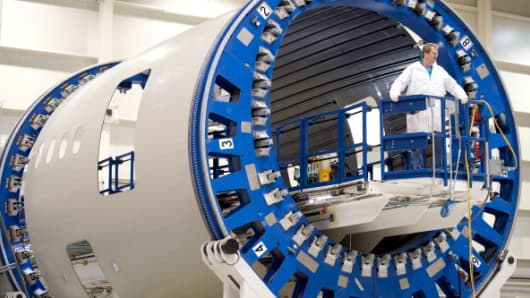Analysts had expected Boeing to report $22.36 billion in revenue with earnings of $1.19 per share, according to a consensus estimate from Thomson Reuters.
For 2013, the company said it expects earnings per share, excluding items, of $6.10 to $6.30, and forecast capital expenditures of $2.3 billion to $2.5 billion.
Boeing said its current guidance for 2013 assumes no significant discount for the Federal Aviation Administration's 787 investigation into the lithium-ion batteries used on the aircraft that had experienced multiple problems and raised questions about their reliability. Boeing also said it is on track to produce 635 to 645 aircraft in 2013, including 60 787s.
"Our first order of business for 2013 is to resolve the battery issue on the 787 and return the airplanes safely to service with our customers," said Boeing Chief Executive Jim McNerney.
Boeing has been buffeted by a wide-ranging controversy surrounding the battery used by its 787 Dreamliner, which forced regulators to ground the aircraft. In November, the company announced a round of layoffs that would shave 30 percent of its management jobs and close several facilities in California.
Earlier Wednesday, Japan's two biggest airlines said they had repeatedly replaced sub-par lithium-ion batteries on their Dreamliners in the months before the two incidents that led to the 787 groundings.
On Jan. 16, the FAA ordered U.S. airlines to stop flying 787s, and other regulators around the world quickly followed suit.
The comments from All Nippon Airways, the biggest customer of the 787 to date, and Japan Airlines indicated problems with the battery's reliability long before one caught fire on a JAL 787 at Boston's Logan Airport on Jan. 7, and a second battery was badly charred and melted on an ANA domestic flight a few days later.
That flight was forced to make an emergency landing. The two airlines operate 24 of the 50 787s in service. United Airlines is the only U.S. carrier currently flying the 787.
"Batteries are a replaceable unit on airplanes, regardless of the technology used. Every day there are on the order of five or six batteries on Boeing airplanes that are removed and replaced — about 2,000 per year. We have an ongoing process to look for opportunities to extend the service life of replaceable units like batteries across our fleet," the company said in a statement Wednesday.
It added: "We have not seen 787 battery replacements occurring as a result of safety concerns. The batteries are being returned because our robust protection scheme ensures that no battery that has been deeply discharged or improperly disconnected can be used. The third highest category for battery returns is exceeding the battery shelf life — this is a fact of life in dealing with batteries; they sometimes expire and must be returned."
Boeing said that while it is continuing to build the Dreamliner, it has halted deliveries, and analysts have raised concerns about the cost of the grounding and fixing the battery problem on about 125 jets that Boeing has built so far.
—Reuters contributed to this report.




